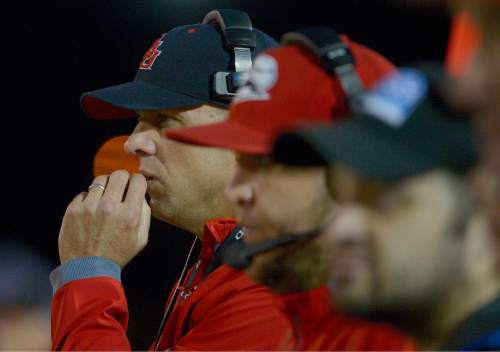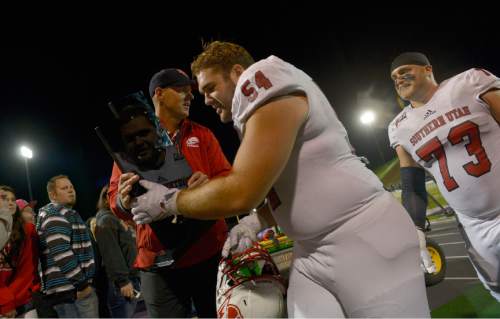This is an archived article that was published on sltrib.com in 2015, and information in the article may be outdated. It is provided only for personal research purposes and may not be reprinted.
The last time Southern Utah University's football coach headed north on I-15 to become an assistant at another school, the Thunderbirds improved the following season.
That won't happen this time.
Not even Ed Lamb himself reasonably could have hoped to top SUU's 2015 performance. The program's Big Sky Conference championship made the timing good for Lamb to join Kalani Sitake's BYU staff as assistant head coach, even if that move defies a standard career trajectory.
In a casual conversation early in his eight-year SUU tenure, I mentioned to Lamb how a former head coach at FCS member South Dakota State, a team that regularly appeared on SUU's schedule, once became a BYU assistant. Lamb said that would not be a logical move in this era, because SDSU was such a solid program.
So Lamb's coming to BYU reflects both his endorsement of Sitake and the reality that sustaining success in the Big Sky will always be tough for SUU. In a November interview, when I asked what had kept him in Cedar City for eight years, Lamb said, "There's just always been something more to accomplish."
The T-birds beat Northern Arizona that week to win a championship in probably the strongest FCS conference in the country — with the lowest budget in the 13-school league. The achievement undoubtedly altered Lamb's answer to that question. With a marketing background in bigger programs, Jason Butikofer can strengthen SUU financially as the school's new athletic director. Yet competing with the Big Sky's top-tier schools every year is asking a lot.
SUU fielded a very good team in 2015, finishing 8-4 with four seniors who likely will appear in NFL training camps next summer — defensive end James Cowser, cornerback LeShaun Sims, safety Miles Killebrew and quarterback Ammon Olsen.
So the convergence of SUU's high point, Sitake's hiring at BYU and Lamb's loyalty to the school as a former defensive lineman (although he's not an LDS Church member) made the move attractive to him. He deserves appreciation in Cedar City, where getting football fans to pay more attention to the local school than BYU is part of the challenge.
Gary Andersen left SUU after one season, having shown improvement with a 4-7 record before returning to Utah as defensive line coach in 2004. The T-birds went 6-5 the following season under Wes Meier (with Sitake having remained on the SUU staff that season), but the program then spiraled downward until Lamb arrived in 2008. Having inherited an 18-game losing streak, Lamb finished with a 45-47 record that included two FCS playoff losses. Otherwise, he would have broken even — and this year's conference title was remarkable, in a league with Montana, Montana State and Eastern Washington.
The effect of SUU's 2015 breakthrough is that Sitake will benefit from Lamb's experience, as a strong addition to his staff. Of the three assistants Sitake has hired so far, Lamb has the best coaching credentials. Ty Detmer is a very good acquisition as offensive coordinator, simply because he never had indicated any desire to coach above the high school level, but he's obviously unproven. Ilaisa Tuiaki also will have to establish himself as a defensive coordinator. In contrast, wherever Sitake plugs in Lamb — with special teams, for example — Lamb will be influential.
Players respond well to him. Lamb is "very up front," Olsen said in November. "He'll tell you what he's thinking, which I love about him."
Even though Sitake has learned well from Andersen and Utah's Kyle Whittingham over the past 13 seasons, he'll need all the advice Lamb can give him about becoming a successful head coach.
Twitter: @tribkurt





